|
1904 Oriental Lodge
No. 385 F. & A. M. Clock
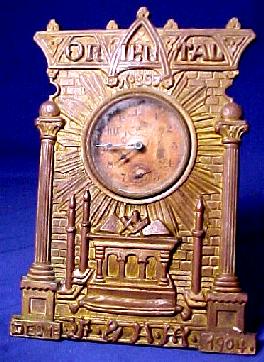
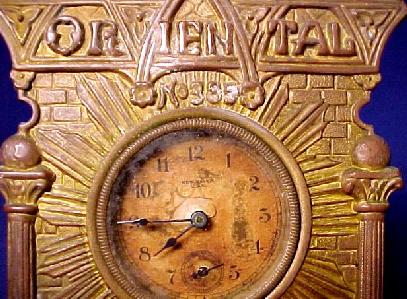
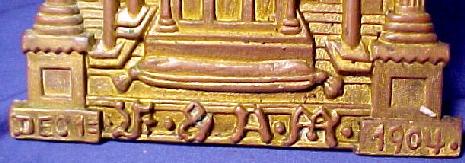
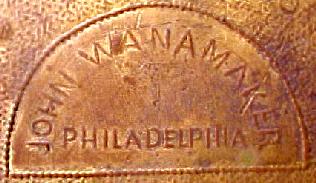
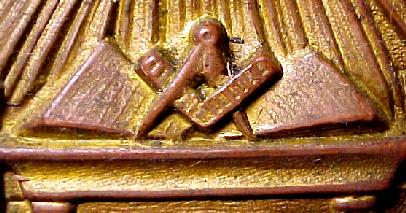
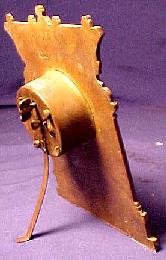
This special and rare
antique clock was made by John Wanamaker of Philadelphia, P.A. for Oriental Lodge No. 385.
It is in excellent condition and is dated 1904. It is cast in brass and has a nice
patina. All of the emblems are sharp and crisp. This clock stands 7 inches
tall.
Brother John
Wanamaker
(1838 -
1922)
Internationally known as a
merchant, John Wanamaker was born in Philadelphia, Pennsylvania, in 1838.
Little is known of his early life, but after a few years as secretary of the
Philadelphia Young Men's Christian Association, he and his new brother-in-law,
Nathan Brown, opened a men's clothing store called "Oak Hall" in 1861.
In 1869, a year after Brown's death, Wanamaker opened the more fashionable John
Wanamaker & Company. He turned this store over to his brothers to manage
when in 1876, in time for the National Centennial, he opened the "Grand Depot",
a huge dry goods and men's clothing store located in a former Pennsylvania
Railroad depot. Unable to attract other merchants to open shop under his
roof, in 1877 he opened a number of "specialty shops" that flourished after a
year.
He expanded into New York City in 1896 and continued enlarging his innovative
"department" stores. He advertised effectively in newspapers and implemented a
money-back customer guarantee.
A devout Presbyterian, he founded the Bethany Sunday School (1858), and
supported temperance and the Pennsylvania Blue Laws. An enthusiastic Republican,
he was unsuccessful in his bid for various political offices. However, as
a reward for his support of Benjamin Harrison, he was made Postmaster General of
the United States in 1889 and created several improvements, including the
introduction of the Parcel Post system.
He was patriotic even to the detriment of his own business. He required
military drill of his male clerks and offered to release them for service during
the Spanish-American War and the First World War. But he truly cared about
his labor force. To help his workers improve themselves, he provided
business classes and benefits for his employees.
Masonically, he was made a Mason-At-Sight with two other candidates, (John L.
Kinsey and Rabbi Joseph Krauskopf) by virtue of the presence of Right Worshipful
Grand Master William J. Kelly, in an Emergent Grand Lodge, held March 30, 1898,
at the age of 62. Being a Mason-At-Sight meant that he did not belong to a
Lodge, and many solicited for his affiliation. On January 9, 1900 he
elected to become a member of Friendship Lodge No. 400 in Jenkintown,
Pennsylvania, then a predominantly rural community. He was elected Senior
Warden, and the following year served as Worshipful Master of this Lodge.
Wanamaker belonged to no other fraternal society. He did become
enthusiastically involved in many of the affiliated bodies of Freemasonry, and
received the Thirty-Third Degree in the Ancient Accepted Scottish Rite, but he
always regarded the first three degrees of Freemasonry as not only fundamental,
but essential in the understanding of Masonic beliefs and the reason for the
existence of the Craft.
He was appointed to serve the Grand Lodge as Chairman of the Library Committee
by R. W. Grand Master James W. Brown, and was largely responsible for the
phenomenal growth of the collection at the inception of the Library. Using
his own personal wealth, he gathered together books, letters, and artwork which
pertained to the history and moral teachings of Freemasonry. While serving in
that position he donated a copy of William Joseph Williams' portrait of George
Washington in Masonic regalia, painted in 1794 at the request of Alexandria
(Virginia) Lodge No. 22. By the end of his tenure as Chairman, the Library
had over 17,000 volumes, and over 7,400 works of art and Masonic relics.
His Masonic character was intimately tied to his business practice, summed up in
the memorial tablet surmounting the Wanamaker Store on the celebration of its
Completion Day, June 11, 1910, and duplicated on a ceremonial medal at the
Diamond Jubilee of his business career in 1921, as follows:
"Let those who follow me continue to build with the plumb
of Honor, the level of Truth, and the Square of Integrity, Education, Courtesy
and Mutuality."
He died on December 12, 1922.

|
